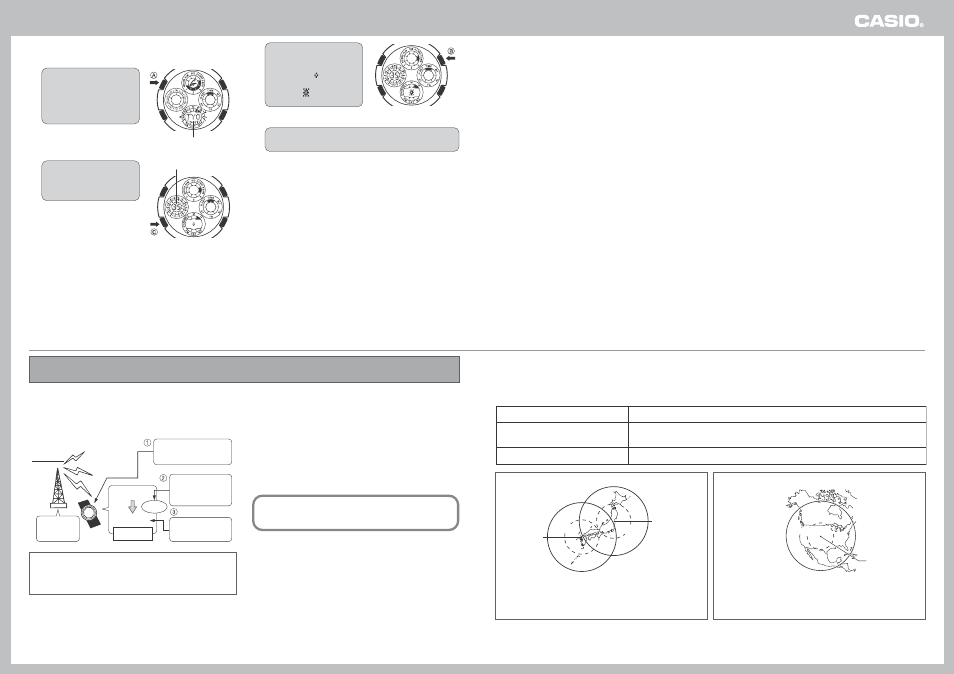How a radio-controlled watch works, Operation guide 3334, Specifying the illumination duration 1 – G-Shock 3334 User Manual
Page 3: Reception range, What is a radio-controlled watch, Calibration signal

Operation Guide 3334
3
Specifying the Illumination Duration
1.
In the Timekeeping Mode,
hold down
A
A
A
A
A
for about
one second until the city
code starts to flash in the
bottom dial. This is the
setting screen.
2.
Press the
C
C
C
C
C
button three
times to move the flashing
to the seconds count in
the left dial.
Reception Range
This watch is designed to receive the standard time calibration signal of Japan (JJY) or of the United States (WWVB). The signal that is
received depends on the current Home City setting.
•
For information about selecting a Home City, see “Manually Setting the Time and Date”. For information about city codes, see the
“City Code List”.
Home City
TYO
LAX, DEN, CHI, NYC
Transmitter
Either the Mt. Otakadoya signal (40kHz) or the Mt. Hagane signal (60kHz)
Fort Collins, Colorado signal
1000km
Mt. Hagane
(60kHz)
Mt. Otakadoya
(40kHz)
500km
1000km
500km
Transmitter Location
•
Under optimum conditions, the calibration signal should be
receivable up to 1,000 kilometers from the transmitter. Note
that the wave is relatively weak at distances greater than
500km, so reception may be poor at long distances.
Transmitter Location
3000km
1000km
Fort Collins
•
Under optimum conditions, the calibration signal should be
receivable up to 3,000 kilometers from the transmitter. Note
that the wave is relatively weak at distances greater than
1,000km, so reception may be poor at long distances.
•
Geographic contours, nearby buildings, the season, the time of day, can even make reception impossible even when you are within range of
the transmitter.
•
Best reception is possible late at night.
What is a radio-controlled watch?
Your radio-controlled watch is designed to receive a time
calibration signal that contains standard time data and adjust its
current time setting accordingly.
Signal is received using
built-in antenna.
Signal Data
Cesium
Atomic Clock
Transmitter
Long-wave
Calibration Signal
Internally
Decode
Watch
Time Data
Watch decodes
received data and
converts it to time
data.
Time is adjusted
according to time
data.
After the watch receives the time calibration signal, it performs
internal calculations to determine the current time. Because of
this, there may be an error of up to one second in the
displayed time.
Calibration Signal
•
The Japanese calibration signal (Call Sign: JJY) is maintained by
the independent Japan Ministry of Posts and Telecommunications
Communication Research Laboratory (CRL). It is a long wave
signal transmitted 24 hours a day from the Mt. Otakadoya
transmitter (40kHz) located in Tamura-gun, Fukushima Prefecture,
and from the Mt. Hagane transmitter (60kHz) located on the
border between Saga Prefecture and Fukuoka Prefecture.
•
The U.S. calibration signal (Call Sign: WWVB) is transmitted by
the National Institute of Standards and technology from Fort
Collins, Colorado.
Though the calibration signal is normally transmitted 24 hours
a day, transmission may be interrupted occasionally due to
maintenance, lightening, etc.
How a Radio-controlled Watch Works
City Code
Seconds
(3 times)
3.
Press the
B
B
B
B
B
button to
toggle the illumination
duration between about
1.5 seconds ( in the
bottom dial) and 2.5
seconds (
in the bottom
dial).
4.
After the setting is the way you want, press the
A
A
A
A
A
button to exit the setting screen.
•
The watch will also exit the setting screen automatically if you
do not perform any operation for about two or three minutes.
